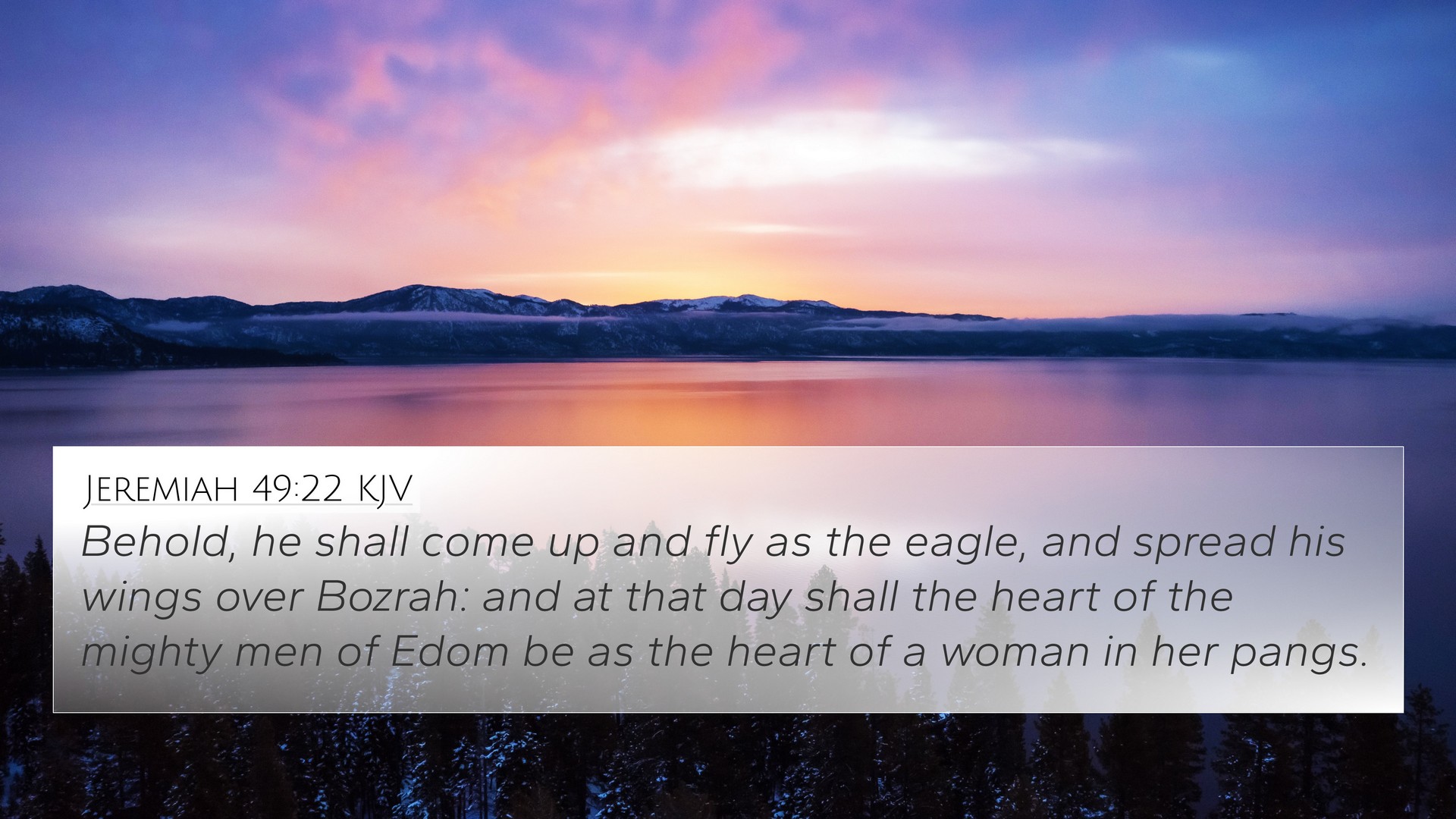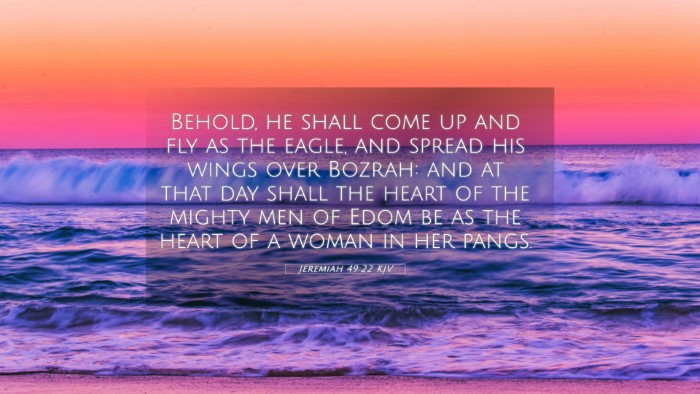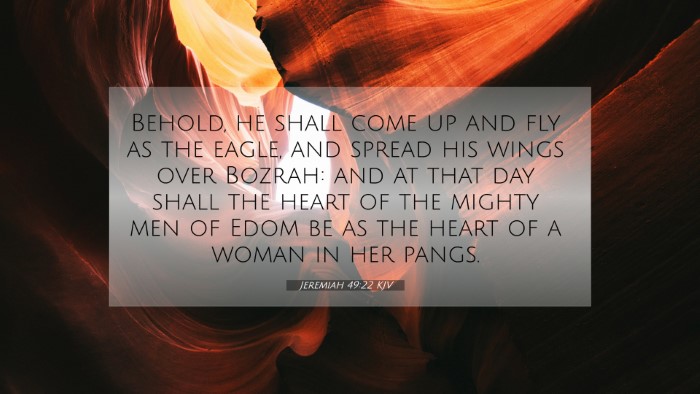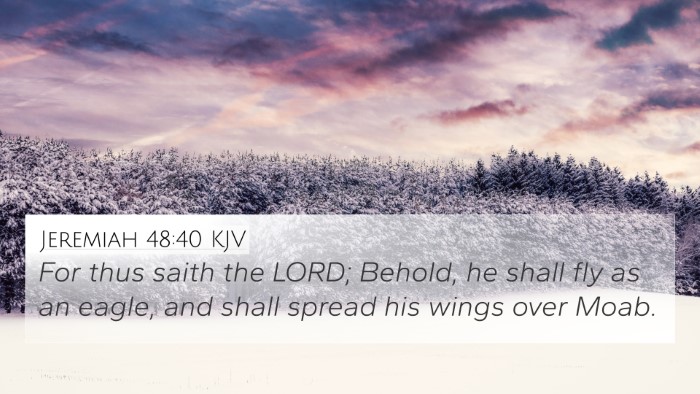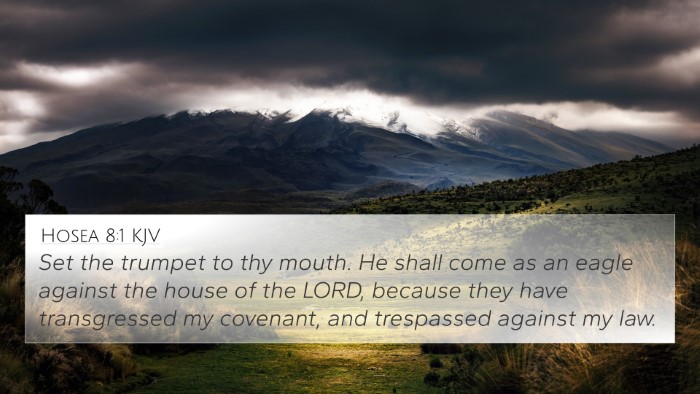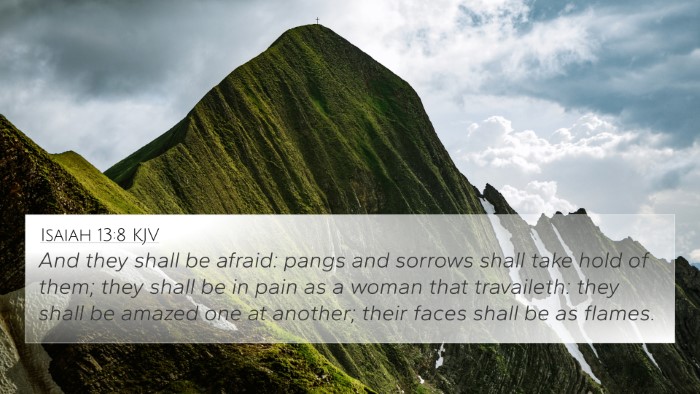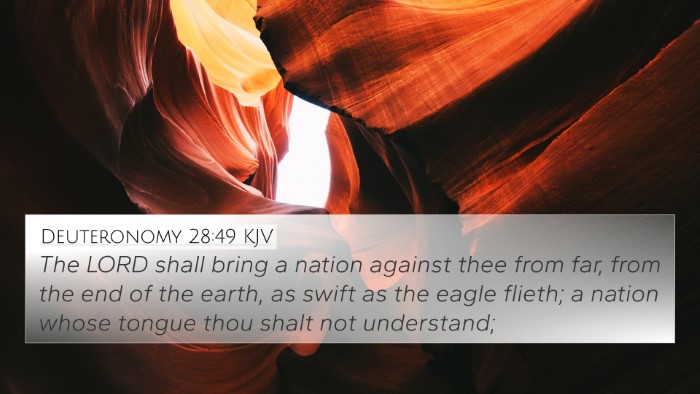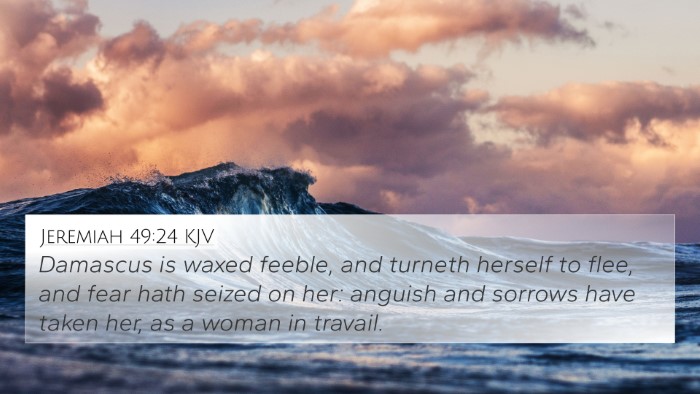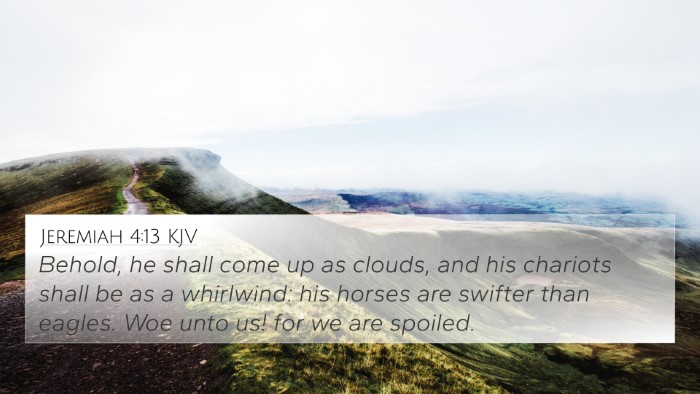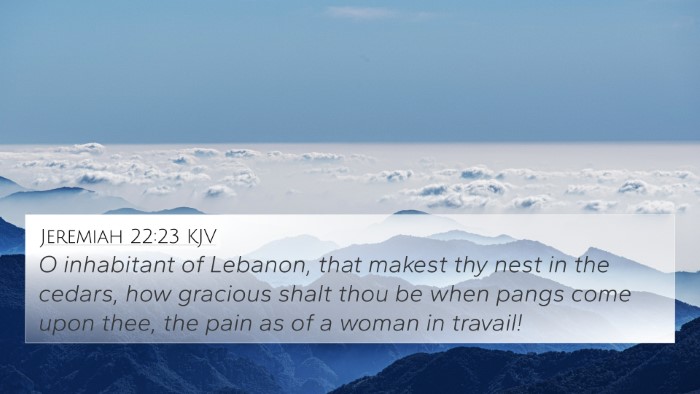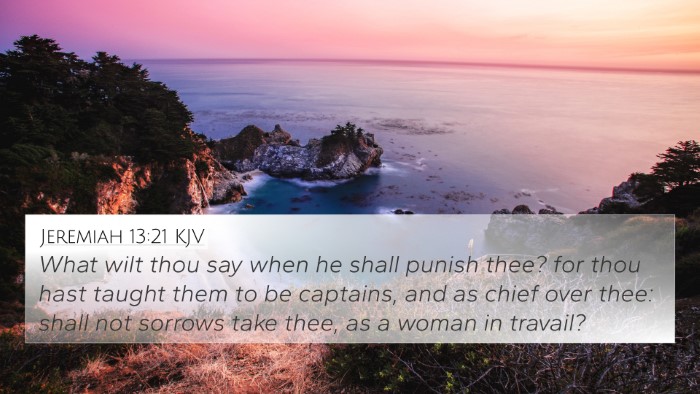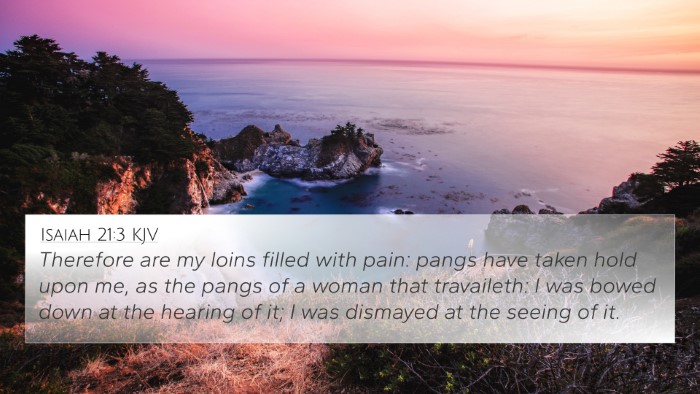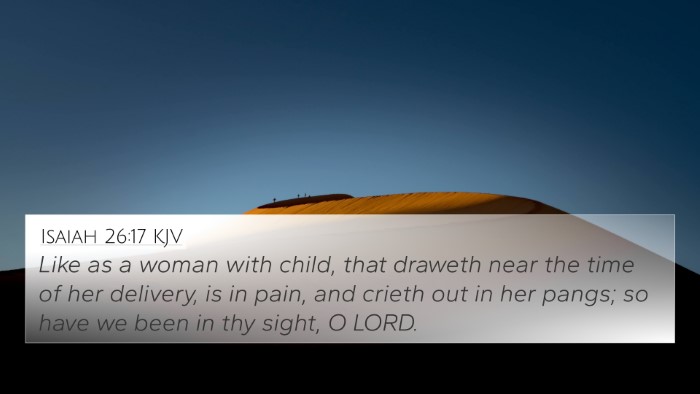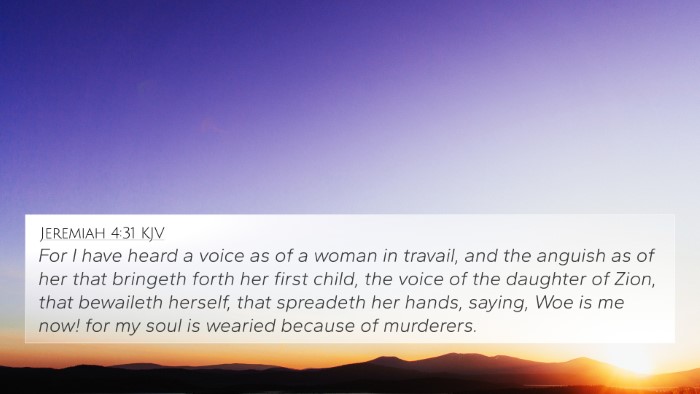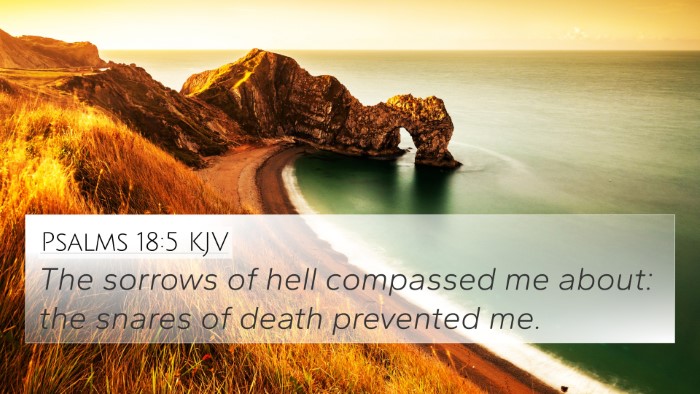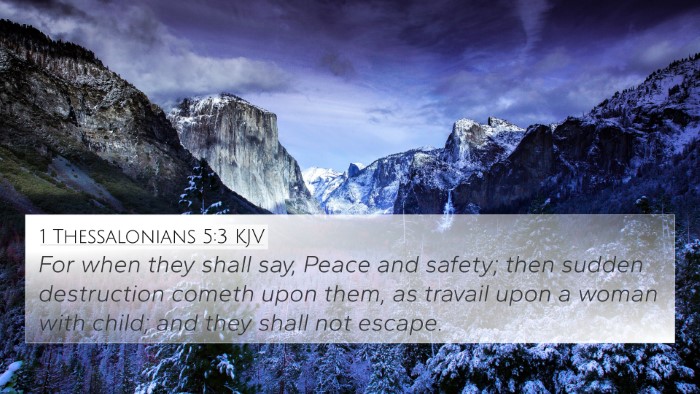Understanding Jeremiah 49:22
Jeremiah 49:22 states: "Behold, he shall come up and fly as the eagle, and spread his wings over Bozrah: and at that day shall the heart of the mighty men of Edom be as the heart of a woman in her pangs." This verse portrays impending judgment and destruction facing the people of Edom.
Summary of Insights from Commentaries
This verse has been examined by several traditional biblical commentators. Below, we synthesize insights from Matthew Henry, Albert Barnes, and Adam Clarke to provide a comprehensive understanding. Each offers a unique perspective on the imagery used in the text and the implications for Edom.
Matthew Henry's Commentary
Matthew Henry describes the arrival of God's judgment as an overwhelming force, akin to an eagle swooping down. The eagle symbolizes speed, strength, and a decisive action, illustrating how swiftly and decisively God’s judgment will descend upon Edom. Henry emphasizes the catastrophic emotional state of the Edomites, likening it to the traumatic experiences of childbirth, indicating their utter distress and inability to respond to the impending doom.
Albert Barnes' Commentary
Albert Barnes notes that the "eagle" metaphor exemplifies God’s authority and control over the nations. He suggests that the imagery of the eagle spreading its wings signifies the might and reach of divine judgment. Barnes also contributes to understanding the historical context, seeing it as a prophetic announcement of Edom's downfall at the hands of Babylon, which would lead the men of Edom to experience vulnerability unlike any before.
Adam Clarke's Commentary
Adam Clarke remarks on the phrase "as the heart of a woman in her pangs," pointing to intense fear and anguish faced by Edom’s warriors who once might have been strong and fearless. Clarke highlights the transition from pride to panic, emphasizing that divine retribution will lead to a radical emotional and psychological shift, stripping them of their former bravado.
Inter-Biblical Connections
This verse holds significant connections with various biblical themes and verses. Here are some notable cross-references that enhance understanding:
- Obadiah 1:3-4: Discusses the pride of Edom and their resultant downfall.
- Ezekiel 25:12-14: Prophecies against Edom for their actions against Israel.
- Isaiah 34:5-8: Portrays a detailed vision of judgment against the nations, including Edom.
- Lamentations 4:21: Speaks to the desolation of Edom as a nation.
- Malachi 1:4: Addresses the perpetual desolation of Edom as God's judgment.
- Jeremiah 48:40: Similar imagery of swift destruction against Moab, showcasing God's judgment.
- Luke 21:26: Comparatively discusses men's hearts failing them for fear in times of judgment.
- Revelation 19:17-18: Vision of final judgment reminiscent of swift divine intervention.
- Matthew 24:19: Highlights the distress and suffering during times of trouble.
- Hebrews 10:31: Warns of the fearful consequences of falling into the hands of the living God.
Thematic Connections and Interpretations
Thematically, Jeremiah 49:22 deals with the concepts of judgment, fear, and the sovereignty of God over nations. This verse serves as a reminder that God is ultimately in control of history and will act upon the nations, rewarding righteousness and punishing evil:
- The sovereignty of God: The swift action of the eagle represents God's authority over the plight of nations.
- Judgment Day: Highlights the reality of divine judgment that leads to fear, especially in those who oppose God.
- Emotional turmoil: Reflects the psychological impact of divine retribution on the powerful and proud.
Tools for Bible Cross-Referencing
For deeper insights into cross-referencing biblical texts, several tools and methods can be utilized:
- Consider using a Bible concordance to find related verses easily.
- A Bible cross-reference guide can help identify scripture connections systematically.
- Cross-reference Bible study methods such as thematic studies enrich understanding.
- Utilize Bible reference resources that provide comprehensive information on scriptural interconnections.
Conclusion
In summary, Jeremiah 49:22 serves as a profound reminder of the consequences of pride and the inevitability of divine judgment. By examining this verse and its surrounding context through traditional commentaries and cross-referencing related biblical texts, one can gain a holistic understanding of the themes present in scripture. Engaging with these tools for Bible cross-referencing furthers the exploration of the intricate connections within the biblical narrative.
